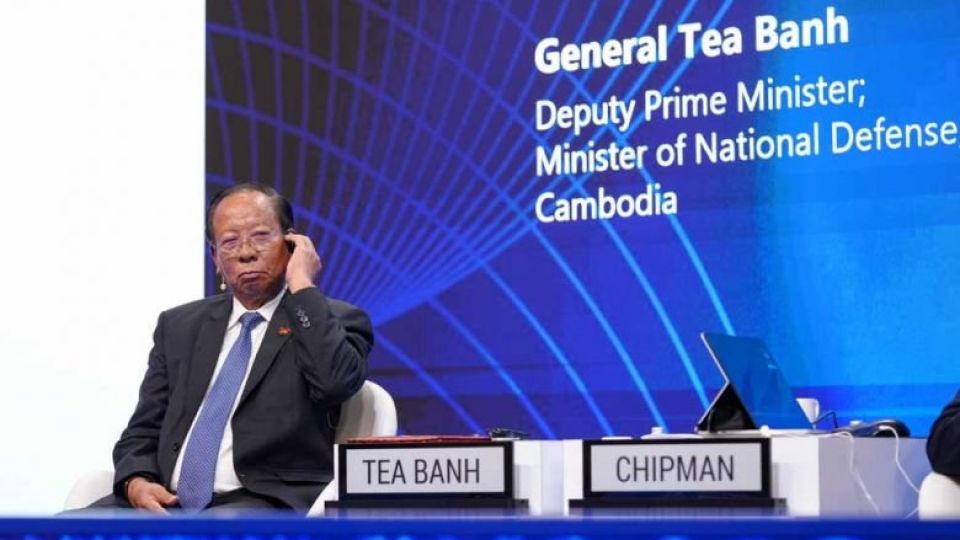June 6, 2023
PHNOM PENH – Deputy Prime Minister and Minister of National Defence Tea Banh urged cooperation from all sides to end the conflict between Russia and Ukraine, calling for a return to the negotiating table, in order to find a win-win solution.
“We have also been plagued with vigorous regional and global security issues. One vital objective is a collective effort to bring an end to the Russian-Ukraine war,” he said, while addressing the 20th IISS Shangri-La Dialogue, an Asia security summit held in Singapore on June 4.
Tea Banh explained that Cambodia opposed the use of force by one country against another, state separations or the occupation of a sovereign state. He added that Cambodia believes that ending a war requires mutual concessions, which includes ceasing the use of force to solve problems, respect for international law, pausing external encouragement to expand the war and ceasing economic sanctions.
“It is evident we do not have any specific models to follow in this situation other than the acknowledgement that we cannot end war through war,” he said.
“The most suitable choice is to end the bloodshed and return to the negotiation table in the spirit of a win-win outcome. Russia, Ukraine and other countries in the region will continue to live alongside one another for hundreds of years in the future,” he added.
He called for a solution which would honour both sides.
“We certainly do not want to see anyone being forced into the war,” he said, adding that Cambodia supports all initiatives which provide political solutions to end the war, such as China’s 12 points initiative to resolve the Russian-Ukraine crisis raised by Beijing recently.
Cambodia appealed to the international community to provide similar initiative which aimed at obtaining a political settlement, with Tea Banh noting that if the fighting continues, both parties will ultimately endure significant losses.
He highlighted that tensions between the major powers have hindered the harmonisation and prosperity of other nations and that it is obvious that competing parties will not gain any substantial benefit, as it is inevitable that they will remain dependent on one another for the long term.
“As a member of ASEAN, Cambodia wishes to see changes in the practice of rival nations from tit-for-tat accusations to working together in order to achieve shared benefits, stability, and prosperity,” he said.
“We also wish to see the easing of tensions and a return to normalcy in the South China Sea, as well as finding an acceptable solution to end the Russia-Ukraine war,” he added.
He noted that the establishment of some mechanisms and partnerships introduced by some major countries within the region were being judged from different perspectives, suggesting that it would be a perfect scenario if these mechanisms or partnerships serve the purpose of encouraging peace, stability, and prosperity in the region.
“On the contrary, action that causes destruction to other nations generates tensions within the region, regardless of the reasoning of a strategic balance. We need to weigh up transparency and the interests of each country,” he said.
He also mentioned the accusations that Cambodia has faced surrounding the modernisation of Ream Naval Base.
“Certainly, we are happy to provide transparency of our activities to avoid misunderstandings,” he said.
Tea Banh also touched on the issue of Myanmar. He said successful resolution cannot be guaranteed if there is no true commitment from within Myanmar itself.
“Establishing trust between the relevant parties is the key to solving this issue,” he explained.
The defence minister also highlighted the Kingdom’s peacekeeping operations under the UN umbrella, noting that while there are internal conflicts and civil wars occurring, especially in Africa – causing tremendous humanitarian crises – peacekeepers are indeed a much-needed element.
“Cambodia is strongly committed to enhancing our capabilities and participation in peacekeeping operations under the UN Framework, in order to help and build harmonisation for those who are suffering,” he said.
“Notably, last year Cambodia initiated a concept paper to enhance ASEAN women’s participation in overseas peacekeeping operations,” he added.
He also expressed concerns surrounding the pressing issue of climate change.
“Without a doubt, destruction of our ecosystem and pollution occur all over the world. However, industrialised countries remain major contributors to climate change,” he said. “We have witnessed numerous efforts to reduce the risk to our earth. Unfortunately, we have not seen any substantial improvements. We continue to see reports on the climate change situation worsening.”
He urged more robust collective efforts in this matter, especially from major industrialised nations, in setting examples and trying to reduce greenhouse gas emissions and pollution in all forms.
Kin Phea, director of the International Relations Institute at Royal Academy of Cambodia, noted that the points raised by Tea Banh are enshrined in Cambodia’s unwavering foreign policy.
“The defence minister stressed that the Russia-Ukraine conflict cannot be solved by means of ‘war to end war’, but only through peaceful negotiations, in line with the UN Charter, international law, or through a win-win policy. This is the only way to secure a long lasting peace,” he said.
“If direct and indirect players continue to encourage the fighting, through the delivery or arms, or any other ways of fuelling the conflict, then the war will not end,” he added.
Phea warned that if the fighting continues, then the current global fuel and food crises will only grow more serious.
Chinese Minister of National Defence Li Shangfu also addressed the summit. He said China intends to continue to participate in joint exercises, including the China-Cambodia Golden Dragon drills.
“Since 2002, China has held around 300 joint exercises with more than 60 countries. Going forward, China will continue to participate in cooperation on military medicine, humanitarian mine action, and peacekeeping under the ASEAN framework,” he said.
“We will deepen and expand bilateral and multilateral exchanges with other countries in the region on equipment and technology, military academies, logistics support, military culture, military meteorology, and public health,” he added.


